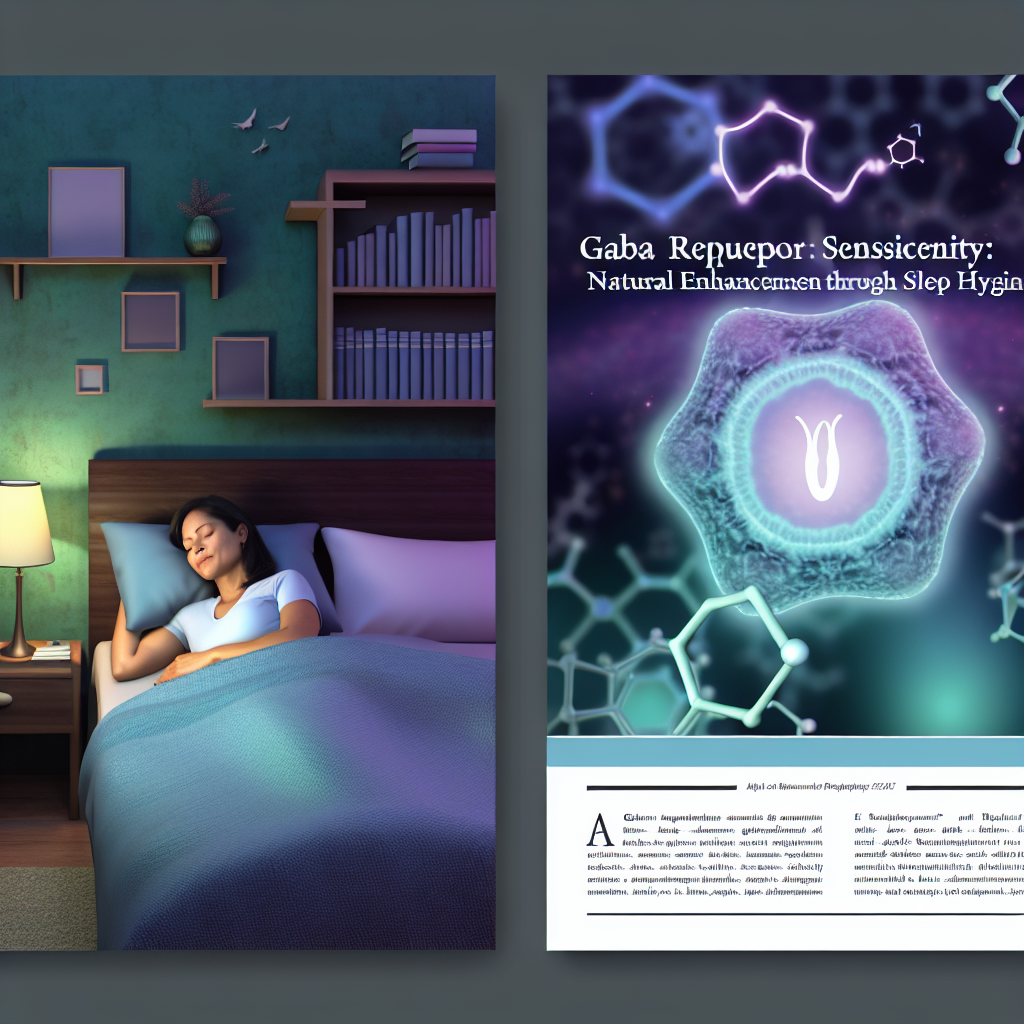GABA Receptor Sensitivity: Natural Enhancement Through Sleep Hygiene
Introduction
In the quest for restorative sleep, the science behind neurotransmission offers valuable insights. A particularly critical player in this process is gamma-aminobutyric acid (GABA), the brain’s primary inhibitory neurotransmitter. GABA’s function is to promote calmness, reduce neuronal excitability, and support neurological balance. At the heart of its function lie GABA receptors—protein structures that bind to GABA and regulate its calming effects. The sensitivity and responsiveness of these receptors can significantly influence sleep quality, duration, and circadian rhythm stability.
Many pharmaceutical sleep aids, such as benzodiazepines and non-benzodiazepine hypnotics like zolpidem, work by enhancing GABA receptor activity. However, long-term use of these drugs can lead to desensitization of GABA receptors, dependence, and diminished efficacy. This underscores the importance of exploring natural strategies to maintain or even enhance GABA receptor sensitivity.
One of the most effective ways to naturally support GABA receptor function is through proper sleep hygiene. This encompasses a set of behavioral and environmental practices designed to optimize sleep quality without the reliance on medication. Incorporating simple habits such as consistent sleep schedules, reduced screen exposure before bed, optimal bedroom environments, and mindful relaxation techniques may significantly impact how GABA receptors respond to physiological demands for restfulness.
Modern lifestyles, however, pose constant challenges to achieving good sleep hygiene—emphasizing the need for practical, science-backed solutions that promote better brain health and neurotransmitter balance. With increasing research linking the quality of sleep hygiene to the neurophysiology of GABA systems, individuals across all age groups can adopt these strategies to encourage more restful sleep and robust nervous system function naturally.
Understanding and enhancing GABA receptor sensitivity should not be limited to pharmacologic interventions. This article delves into the role of GABA in sleep regulation, identifies lifestyle factors that naturally support receptor function, and highlights medical studies that confirm the effectiveness of non-pharmacological approaches. In an era driven by sustainable health choices, the potential of sleep hygiene to restore neurochemical balance offers a promising direction for better sleep health for all ages.
🧠 Understanding GABA: The Brain’s Natural Sleep Regulator
GABA (gamma-aminobutyric acid) is the brain’s primary inhibitory neurotransmitter, responsible for calming nervous system activity, reducing stress, and supporting the transition into sleep. When GABA binds to its respective receptors, it reduces neuronal firing, facilitating relaxation and sleep onset. Sensitive and well-functioning GABA receptors ensure that this process occurs smoothly, promoting consistent and deep sleep.
📉 The Risk of Desensitization: Why Medications May Backfire
While medications like benzodiazepines enhance GABA’s effects in the short term, long-term use often leads to reduced receptor sensitivity and dependency risks. Over time, the brain compensates by downregulating receptor responsiveness, making it more difficult to achieve restful sleep naturally. This highlights the need for integrative solutions that support GABA receptor function without reliance on drugs.
💤 The Power of Sleep Hygiene for GABA Optimization
Sleep hygiene refers to lifestyle and behavioral practices known to promote high-quality sleep. Maintaining a fixed bedtime and wake time synchronizes the circadian rhythm, which has been shown to support consistent GABAergic signaling. Reducing screen time an hour before bed, minimizing light and noise, and engaging in pre-sleep wind-down routines can enhance GABA’s calming influence on the brain.
🔬 Scientific Studies Linking Lifestyle to GABA Sensitivity
- Chronic Insomnia and Reduced GABA: A Nature Neuroscience study found that individuals with insomnia had significantly lower GABA levels in sleep-regulating brain regions like the thalamus (Winkelman et al., 2008).
- Effect of Circadian Alignment: The Journal of Neuroscience reported that irregular sleep disrupted GABA activity in the suprachiasmatic nucleus (De Jeu & Pennartz, 2014). A consistent sleep schedule reinforces healthy GABA patterns.
- Physical Activity Enhances GABA: A 2016 controlled trial in NeuroReport demonstrated that moderate aerobic exercise increased GABAergic activity and improved sleep quality (Maddock et al., 2016).
- Magnesium and Nutritional Support: Magnesium-rich foods were shown in Current Pharmaceutical Design to assist in GABA synthesis and receptor activation (Barbagallo & Dominguez, 2010).
- Mindfulness and Meditation: Yoga and deep-breathing techniques were associated with elevated GABA levels in the brain, as reported by Psychosomatic Medicine (Streeter et al., 2012).
🍃 Natural Ways to Strengthen GABA Receptor Sensitivity
Boosting your sleep hygiene isn’t just about better rest—it’s about supporting your brain’s neurochemical foundation naturally. Here are science-backed lifestyle choices to fortify GABAergic regulation:
- Adopt a fixed sleep-wake schedule to stabilize your circadian rhythm and enhance neurotransmitter cycling.
- Engage in regular physical activity like walking, biking, or yoga to elevate GABA levels naturally.
- Eat magnesium-rich foods including spinach, almonds, seeds, and whole grains to support receptor function.
- Practice stress-reducing techniques such as mindfulness meditation, tai chi, or guided breathing to combat cortisol and enhance GABA action.
- Drastically reduce screen exposure before bed to improve melatonin production and promote natural relaxation.
🌙 Conclusion: Redefining Sleep Through Neuroscience and Lifestyle
Neuroscience is steadily revealing how vital GABA receptor sensitivity is to achieving high-quality sleep. Fortunately, enhancing this sensitivity isn’t limited to pharmaceutical interventions. Through natural means such as proper sleep hygiene, regular physical activity, mindful stress reduction, nutritional balance, and consistent circadian alignment, people across all ages can support the optimal function of their GABAergic systems.
Such holistic strategies benefit more than just sleep—they contribute to emotional regulation, cognitive clarity, and overall well-being. In a world where sleep disorders are rising and the use of medications comes with risks, embracing lifestyle changes rooted in science presents an empowering, sustainable path to better sleep. By understanding and applying these practices, individuals take a proactive role in promoting healthy sleep and brain function every night.
📚 References
- Winkelman, J. W., et al. (2008). Reduced brain GABA in primary insomnia: Preliminary data from 4T proton magnetic resonance spectroscopy (1H-MRS). Nature Neuroscience. View Study
- De Jeu, M., & Pennartz, C. (2014). Circadian modulation of GABAergic inhibition in the suprachiasmatic nucleus. The Journal of Neuroscience. View Study
- Maddock, R. J., et al. (2016). Acute Modulation of Cortical GABA Levels by Physical Activity. NeuroReport. View Study
- Barbagallo, M., & Dominguez, L. J. (2010). Magnesium and aging. Current Pharmaceutical Design. View Study
- Streeter, C. C., et al. (2012). Effects of yoga on the autonomic nervous system and GABA in mental health. Psychosomatic Medicine. View Study
For more sleep health insights, visit www.medoze.com.
Concise Summary:
GABA, the brain’s primary inhibitory neurotransmitter, plays a crucial role in regulating sleep. GABA receptor sensitivity is essential for consistent, high-quality sleep, but long-term use of pharmaceutical sleep aids can lead to receptor desensitization. Natural strategies like maintaining a fixed sleep schedule, engaging in physical activity, and practicing stress-reducing techniques can optimize GABA receptor function and promote sustainable sleep improvements without reliance on medications.

Dominic E. is a passionate filmmaker navigating the exciting intersection of art and science. By day, he delves into the complexities of the human body as a full-time medical writer, meticulously translating intricate medical concepts into accessible and engaging narratives. By night, he explores the boundless realm of cinematic storytelling, crafting narratives that evoke emotion and challenge perspectives.
Film Student and Full-time Medical Writer for ContentVendor.com




